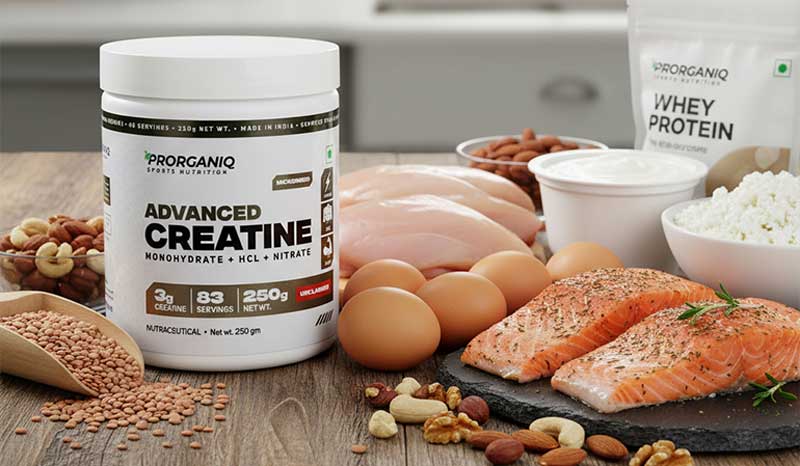8 Indian Foods That Are Good Sources of Creatine
Creatine is one of the most popular supplements in the fitness world. It’s well known for boosting strength, stamina, and muscle growth. But did you know creatine is also naturally present in some foods?
If you’re an Indian gym-goer or athlete who wants to improve performance through diet, understanding food-based creatine sources is essential. Here’s a guide tailored for the Indian diet.
What is Creatine?
Creatine is a compound stored in muscles and used during high-intensity activity. It helps in quick energy production, making it a favorite among athletes and bodybuilders.
While our body makes creatine naturally, getting it from food improves performance levels. However, creatine-rich foods are mostly animal-based, which means vegetarians and vegans may need supplementation.
8 Indian Foods Rich in Creatine
Discover the best creatine-rich foods in India, from chicken and fish to mutton. Learn natural sources, benefits, and why supplements may still be needed.
1. Red Meat (Mutton, Beef, Pork)
-
Creatine content: ~4–5 g per kg
-
In India, mutton (goat/lamb) is a preferred source of red meat and a strong natural source of creatine. It also provides high-quality protein and iron.
2. Fish (Rohu, Hilsa, Catla, Salmon, Tuna)
-
Creatine content: ~3–10 g per kg (varies by species)
-
Fish is among the best sources of creatine.
-
Rohu & Catla (commonly eaten freshwater fish in India) have moderate creatine levels.
-
Imported salmon and tuna are richer options if available.
-
Herring (less common in India) is one of the highest sources worldwide.
-
3. Chicken
-
Creatine content: ~3.5–4 g per kg
-
A staple for Indian non-vegetarians, chicken provides a good dose of creatine along with lean protein—perfect for muscle building.
4. Eggs and Dairy (Paneer, Milk, Curd)
-
Creatine content: Negligible
-
Eggs and dairy don’t contain creatine directly, but they are excellent protein sources that support muscle recovery.
5. Seafood (Prawns, Crab, Pomfret, Surmai)
-
Creatine content: ~3–4 g per kg
-
Popular in coastal Indian diets, seafood not only gives creatine but also healthy omega-3 fatty acids for heart and joint health.
What About Vegetarians in India?
Since vegetarian diets have almost no natural creatine, vegetarians and vegans are likely to have lower creatine stores. This is why creatine monohydrate supplements (which are 100% vegetarian and lab-made) are recommended for performance.
Supplements are a practical solution, especially for Indian vegetarians who rely heavily on dals, paneer, and cereals, none of which naturally provide creatine.
How Much Creatine Do You Get from Foods?
To put it in perspective:
-
250 g of chicken or fish = ~1 g of creatine
-
Recommended athletic dose = ~3–5 g per day
That means you’d need to eat 750 g to 1 kg of meat or fish daily to match one scoop of a creatine supplement.
Final Thoughts
-
Non-vegetarians in India can get creatine naturally from mutton, chicken, and fish.
-
Vegetarians cannot rely on diet for creatine and should consider supplementation.
-
Even for non-vegetarians, reaching the ideal daily dose (3–5 g) through food alone is difficult—making creatine supplements the most efficient option.
Creatine is safe, effective, and one of the most affordable performance boosters available.
If you’re aiming for better muscle growth, stamina, or recovery, creatine—whether from food or supplements—should be part of your nutrition plan.

